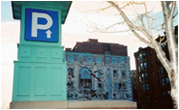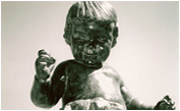|
|
||||||||
 |
 |
 |
 |
|
||||
|
|
|
|
|
|
|
|
|
|





'Falling Into'
by
Whipping down the highway at seventy miles per hour, everything became green and blue. It was as if Amy and I had been misplaced in a modernist painting in which form gives way to color. Green below, blue above, and only the thin grey line that shrank from us to the place where the two solid blocks of color met.
Amy and I were on the great American road trip—heading west, or at least southwest. We had left Cannon Falls, Minnesota at four o'clock the afternoon before, headed south on interstate thirty-five and made our way into Lincoln, Nebraska by midnight. The man at the hotel there had been hospitable, politely making small talk as he asked for my last name fifteen times, my address fifteen times, and my credit card fifteen times, until he finally outsmarted the computer on which he was trying to register us. He asked us about Minnesota. He said that he had a brother in Minneapolis and he was thinking of moving up there. Where were we headed, he asked. Santa Fe. We had never been there before.
We were still in Nebraska at three-thirty on our second day and it seemed as if the monotony of the flat landscape would never end. I continuously turned the dial on my car radio. White noise surrounded us. We hadn't seen any signs of outside life for hours.
"Isn't it beautiful?" Amy said. I looked across her and doubtfully fixed my gaze out the passenger window. There, among the endless fields of kelly green grass stood a lone windmill, swirling slowly in the wind. A pool of water collected at its base creating a snap shot of the brilliant blue sky in the midst of infinite green. Nothing moved but us. "It's just so…" Amy breathed, "beautiful."
"To be converted," explains William James, "to be regenerated, to gain assurance, are so many phrases which denote the process, gradual or sudden, by which the self hitherto divided, and consciously wrong inferior and unhappy, becomes unified and consciously right superior and happy, in consequence of its firmer hold upon religious realities." My confirmation was to be this experience, of the gradual kind. Preparation began as early as kindergarten for many of us. We were filtered out of Sunday mass into Sunday school, where we were taught that disobeying our parents made God angry. We were told how Eve had taken the apple from the tree of knowledge, and that made God angry. We were told how everyone in the world had been evil and that made God so angry that he sent down a huge flood that killed everyone in the whole world, except for whatever made it on to Noah's Ark. I was taught in church from a very young age that I was a broken person, "consciously wrong, inferior, and unhappy." The Bible told me so.
Later, when I was in fifth grade, my priest told the whole congregation that we were surely going to go to hell. I was not surprised. I was scared because I knew it was true. The next week, he came to our Wednesday night Catechism and apologized. "You are not all going to hell," he admitted, "instead you will probably end up in purgatory." He explained that purgatory was similar to time out—it was a place where we could reflect on our sins while being punished for them. But instead of a corner, we would be shoved into a tiny wooden box, with swampy water and alligators and snakes. God would keep us here until we had learned our lesson. Here where even the smallest amount of time, say five minutes, would feel like an eternity. I secretly wished that I could have just gone to hell instead.
"Denver," Amy admitted, "Jaime, I just want to make it to Denver. Have you read On the Road?" I hadn't. "I just wish you could understood how badly I need to be in Denver. You don't even know." I didn't. Amy went back to her book as I watched the mile markers tally our journey.
I wanted Denver too. The rain shadowed high—plains of eastern Colorado rolled into eternity. The same long yellow grass covered each nodding hill we passed. I wanted mountains. A storm was forming on the horizon, blackening the divide between heaven and earth as white lightening snapped at the ground silently. We had a few more hours of good weather driving before we would run into it. The appearance of the grass intensified through a trick of the eye caused by the new contrast of black against gold. I still wanted to see the mountains. I had never seen one before, except for the large hills of Vermont that pose as peaks for Northeasterners. And I knew that the storm was blocking some peak from my view; rain meant mountains.
I roused Amy from her book, pointing ahead. "You see that there?" I gestured toward a stable mass at the edge of the sky, trying to keep at least one hand on the wheel. "That there, a bit to the left. It's the only thing that hasn't moved," I explained, "Amy, I have been watching this for the past twenty minutes and that blob there hasn't moved. I think—I'm not sure—but I think that's a mountain."
I started going to a Lutheran youth group in the tenth grade. We called it pizza study, which as the name implies, meant that the pizza was just as important as the Jesus. There were usually about ten of us crammed into a tiny cinderblock youth room, stocked with second-hand couches and an abstract mural that we designed ourselves. The kids there were my age or younger and they felt like they really had things figured out. Instead of crying alone in their bedrooms with a journal and some horrid pop ballads, these kids talked to God when they had a problem and it seemed to me that God really had things figured out. This God, unlike the one of Catholic Sunday school days, understood my problems. He wasn't going to smite me, or drown me, or put me in a little box to let me know just how bad I had been. He liked me broken. He understood if I slipped up. This God sent his son to hang out with sinners like me.
I went to a Lutheran bible camp in Iowa that summer. The campus was situated on lake Okoboji in what must have been the largest stand of trees in the entire state. It was majestic—awesome. But, I didn't pay that much attention. I stayed in my dorm, or made friendship bracelets with the camp organizers. I talked to the older kids or just sat alone beneath a tree, deep inside the turmoil of my own mind. Everything was still on the outside, but inside I was sprinting without any idea of where the finish line was, or whether or not I even wanted to get there. I wanted everything to stop for me too, so I did the only thing that seemed logical—I prayed.
We got into Santa Fe after midnight. It was too dark to see the landscape, but we could feel it. The slow rise and fall of the highway suggested mountains. Would they be like the ones we had seen in Denver, darting behind the clouds like a coy young girl courted for the first time? Would we want to speak to them in the same way, asking them to draw nearer to the highway, to come down for just a bit so that we could ask how they had gotten so high and what they had seen along the way?
"It's like the Allegory of the Cave," I told Amy, anticipation bursting through my voice. "Right now, we can see only the shadows of the mountains, but we know that they are mountains and we call them mountains. But we still don't really understand them. Tomorrow, when we wake up, it will be like a whole other world. Just imagine it." Amy looked back at me, a smile penetrating her tired anxious eyes.
"My God, Jaime."
She turned away from me, pressing her face against the window. Jeff Buckley was singing "Hallelujah" through the car speakers and she was singing too. She rolled the window down and stuck her hand outside, letting the night wind kiss her fingertips. "It's not a cry you can hear at night, it's not somebody who's seen the light, it's a cold and it's a broken hallelujah," she sang with her eyes closed as I drove on.
God and I had a falling out. I was driving home from a three-hour rehearsal of our high school play, Little Women, staring at the yellow rows of corn and soybeans, when I came to a sudden decision. I did not need religion. I did not want religion. We weren't compatible. It was time we broke up.
It seemed to me that I had spent my entire life searching for something that would magically make me happy, I wanted all of the problems in my life to have an easy answer and religion had advertised itself as this very miracle product. But it failed to deliver. Looking at myself in the rearview mirror as I sped toward home, I realized that I still wasn't happy. Religion wasn't helping. I felt like I had given up so much of myself to this "God" that I couldn't even recognize the face that was looking back at me. I was living my life for Jesus, for heaven, for everything but myself, any time but now.
Some people need religion, I concluded as I pulled into my driveway and slid the car into park. But I want to live for me, I grabbed my backpack out of the back seat, turned off my headlights and shut the car door behind me. I want to live right now, I resolved, walking through the fallen red and yellow maple leaves that covered our yard. Goodbye God. I climbed the steps to my house, walked in, and let the door slam behind me.
It was dark again. Amy and I had been in Santa Fe for three days and, after our recovery from the altitude, we hadn't wasted a minute. We had traversed the Martian landscape, visiting artist inhabited ghost towns, ancient pueblos, and sangria mountains. But now it was nighttime. We paused outside of the house to smoke a cigarette and take in the day.
"It's just so beautiful," Amy said for the thousandth time that day, meaning it even more with every utterance.
"Amy, I think I figured out what it is that makes everything beautiful," I said. "It's the bigness of things. Something is beautiful when we can't understand it. When it becomes so large that it surprises us, sweeps us up out of our everyday life."
"No. No, that's not it. Because here, just look at this road." Amy gestured to the asphalt cul-de-sac that we were standing in. "I mean it's just this stupid meaningless little thing, right? But I can look at this and think that it's beautiful. I mean, first think of all of the tiny rocks in this pavement. Where have each of them been? How did they get here? And then think of all of the people that went into planning this road, and the machines that it took to make it and…"
"There." I said, "There you go. You just made it big."
Solitary, personal, religious experience is the root of all religions according to William James. These fundamental moments in which a human being are dwarfed and in some cases, completely dissolved by the infinite, set up the groundwork for all religious thought. It isn't the dogma of the Catholic Church. It isn't a sacrament like confirmation, or the ritual of a Sunday mass. It isn't even a summer camp or a youth group. All of these outlets that I had spent my entire life looking to for guidance are just the byproduct of something profound—ineffable. This something is described by Marghanita Laski as "ecstasy, transcendence, and aesthetic intensity." It isn't owned by religion. It can occur anywhere in any one, in "some natural wonder, in sexual experience, in childbirth." We can be pulled up and out of the mire of everyday life by simply delving further into it.
Amy and I stood on the edge of the Grand Canyon. There was a slight rain where we were standing, like the mist that blows up off of the ocean. Below us lay an expanse of unfathomable proportions. Ravines, gullies, spires, towers, an entire universe gathered under our feet.
"I never knew it was so big." Amy's voice cracked as she tried to hold back tears.
We stood at the edge of the observation deck, breathing in the damp air. Tourists from across the entire globe were pushing at us, trying to have their turn at the natural wonder. We didn't move. We didn't even notice. Even the air seemed bigger here. The space itself created a presence—a material unidentifiable and yet undeniably real.
A storm cloud was forming inside of the canyon, only inside. This hole held the sky. Rain fell into the tiniest stream that wound its way through the treacherous landscape at the bottom. That tiny river created this 227-mile long, fifteen mile wide, six thousand foot deep canyon. It made something big, something beautiful, out of its miniscule self.
We stood there, all eyes and skin. The rest of the world seemed to fade away for an instant. It was ecstasy, transcendence, aesthetic intensity. This is the feeling that makes one whole—a conversion by nature. I knew that I wasn't wrong, inferior, or unhappy. The world seemed right.
|
 |
||||||||||||||||||||||||||||||||||||
|
|
|||||||||||||||||||||||||||||||||||||
 |
|
||||||||||||||||||||||||||||||||||||
|
|
 |
||||||||||||||||||||||||||||||||||||
|
 |
||||||||||||||||||||||||||||||||||||
|
|
|||||||||||||||||||||||||||||||||||||
|
|
 |
||||||||||||||||||||||||||||||||||||
|
|
|||||||||||||||||||||||||||||||||||||
|
|
|||||||||||||||||||||||||||||||||||||
|
|
|
|
|
|
|
|
|
|
|
| |||||||||||||||||||||||||||
